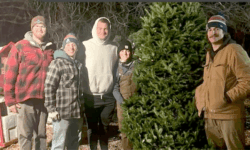[ccfic caption-text format="plaintext"]
By Shelly Santaniello
Hometown Weekly Correspondent
Betsey Metcalf Baker (1786-1867) was an inventor and entrepreneur long before it was socially acceptable for women to be independent thinkers and/or wage-earners.
At age twelve, the native Rhode Islander devised a method to make her own straw bonnets. She couldn’t afford the expensive ones imported from England at the local millinery shop. Yet, this clever preteen was determined to have her own stylish hat.
As the saying goes, where there’s a will, there’s a way.
Betsey experimented with straw at home until she learned how to make it pliable, and thus able to be braided and knotted. Soon she was creating her own fashionable bonnets.
People in Providence, her hometown, encouraged Betsey to patent her invention, but she refused. At Day’s Academy, she taught other girls her craft so they could enjoy the high fashion at a low cost. Eventually, making straw hats became a cottage industry in New England. For women living in agricultural towns, straw came at no cost. Women would bleach the straw using brimstone (sulfur) and coals. After years of experimentation, a seven-straw braiding method was eventually used. Now, for the first time, women would be paid for their handiwork when they sold their hats to store owners.
Betsey wrote in her diary: “For 2 or 3 years we had a very profitable business. I could frequently make a dollar a day.”
The handmade bonnets would eventually be replaced by machine-made bonnets with the onset of the Industrial Revolution. Sewing machines could produce 100 hats in the time it would take a woman to make five hats by hand.
However, this industry was still beneficial to women. In 1801, in Medfield, a factory was opened by Johnson Mason and George Ellis. Later, a second factory was built, at the present site of the Montrose School. This Medfield factory would become the second largest straw hat factory in the United States. The workers were mainly women and girls from Maine and Canada. The demand for women workers helped many families survive the transition from an agricultural to an industrial economy.
So, what happened to Betsey Baker after she innocently began the groundbreaking trend of women working outside the home?
In 1807, Betsey married Obed Baker and moved to Westwood. (At that time, the area was known as West Dedham; Westwood would not become a town until 1897). According to the Westwood Historical Society, Betsey’s husband “was a “teamster” who transported munitions and supplies to New Hampshire, Rhode Island, and Virginia, during the 19th century wars.” In 1812, he built a house for Betsey. The Obed Baker House, commonly known in Westwood as the Red House, still stands today at 909 High Street, across from the Dunkin’ Donuts.
While living in Westwood, Betsey was a teacher and community leader. She had a strong moral compass and did much to help others. Betsey still made her straw bonnets, but for philanthropic purposes. She taught her craft to women from the local Baptist and Unitarian churches so they could raise funds for foreign missions, such as sending aid to those suffering from the Great Potato Famine in Ireland. Betsey and her husband were also anti-slavery activists.
Without a doubt, Betsey Baker, straw hat maker, should be remembered as an innovator and entrepreneur. Also worth remembering is how she used her invention to help others. She never sought a patent and was willing to freely teach others her craft. Betsey should be admired for her charitable nature.
Finally, some might say Betsey should be remembered as an early feminist because she helped women make money and become more independent. However, Betsey had mixed feelings about women leaving their homes to work. She wrote in her diary: “the consequences I fear have been more of an injury than otherwise to the New England states, for girls forsook all other employments such as spinning, weaving and the care of a family by which means they have neglected a necessary part of a female’s employment.”
It may be that Betsey Baker, straw hat maker, was more of an accidental feminist than an intentional one.
Either way, she is an important female figure in New England’s history.

























